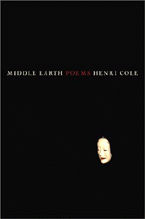Like most poets, Henri Cole is “against the war” and uncomfortable in large crowds. He pulls at his dark sleeves and looks around nervously, searching as if he might find someone he knows. He is the only man in the room wearing a cardigan sweater and not a suit jacket. He is the only man, save the president, wearing his Many Lamps lapel pin during cocktails. It’s an open bar, by the way—whiskey and wine—and Gary the bartender is generous. Gary the bartender is not an actor (although I envision him starring in a movie about this evening, a Hollywood remake of an older, better movie). No, Gary is a well-paid therapist who works these “college” events for the fun it.

Few people know, and it’s never officially mentioned, but Henri Cole was also one of three finalists for the 2004 Pulitzer Prize in poetry. He did not win, but as they say in Hollywood, “It’s an honor just to be nominated.” The Pulitzer Prize carries with it a monetary award of $10,000. Like our real estate, California poetry prizes are outrageously rich—the richest.
We are a strange crowd, an odd mix, like California itself. Guests include the editor of a top-selling woman’s anthology now in its second edition, a college president and an emeritus college president and their first ladies—one in pearls and one in gold rope. There are painters and provosts and community volunteers. There are vice presidents of development and vice provosts and members of the board of trustees. There is a woman who lives in Cary Grant’s house. I tell this woman, Jennifer Diener, that I saw her and Cary Grant’s beach house featured in a special about the houses of Old Hollywood on Home and Garden Television. She’s mad, just mad that she missed it, having never been contacted by the television people that paid her just $100 for filming. She explains to all of us standing around her with our drinks and steak-on-a-biscuit why she charged them: The BBC once paid her $300 to film Cary Grant’s old house.
For the benefit of out-of-towners, Claremont is considered Old California. The town was settled in the late 1880s first by Congregationalists looking to found a college, and then by another bunch of churchgoers who planted great orchards of oranges and lemons. Later, one million lemons per year were shipped out of Claremont to locales as far away as England. We are trying to save the College Heights Packing House right now, save it from demolition, from becoming a mall or a Target or something else we secretly, privately admire.
But we’ve come to 709 Harvard Avenue to honor Henri Cole, not to “Save the Packing House.” We aren’t here for the salmon or for the politics we talk across the tables, the side jokes about the President of the United States and his mad, mad, mad, mad cabinet. We are here to thank Henri Cole for Middle Earth, for wearing his nerves on the surface of his skin, for travelling 14 hours to Claremont to do something he does not really want to do.
Cole reads his poems after dinner because reading in public is part of the deal. He follows his warm-up act, Adrian Blevins, the author of The Brass Girl Brouhaha (Ausable Press, 2003), who is receiving this year’s smaller, Pulitzer Prize-sized $10,000 Kate Tufts Discovery Award. Blevins curses a lot and talks about sex in her poetry and everyone howls with laughter. By the time the poets are reading we are all drunk if we want to be. We are all drunk, thanks to Gary the bartender-therapist.
As Henri Cole gets up to read I am reminded of a review of Cole’s book I read on Amazon.com. A reader wrote that he felt bamboozled because Cole’s Middle Earth turned out to have nothing to do with the Lord of the Rings trilogy. The reader called Cole “Mr. Vague.” I smile thinking about it. For the record, I do not believe this angry reader was from Los Angeles.
At first, after Cole reads each poem, we clap quietly. Then we just thoughtfully, knowingly hum to ourselves. Then there is just the silence, the big wonder of when he’ll finish. I’m wondering if he’ll get his big check tonight like at those celebrity golf tournaments. Has someone made a giant cardboard check and stashed it behind the grand piano? Will there be a picture of Henri Cole grinning with his giant check in the morning newspapers? Unfortunately, no.
When Cole finishes we clap and are told by the president that we can leave, that the party’s over. I’m still thinking about that dirty-mouthed poet, Brevin, who cursed a lot and spoke of disturbing things—about girls who get shot in the neck at the Texaco, and so on. I’m remembering that at the end of her last poem she looked around the room and called us all her “sleepy comrades” and we all laughed and clapped.
As I’m getting up to leave I’m told that tomorrow the actual “public ceremony” will take place at the Huntington Library, at the old mansion that’s now a museum. I tell the woman who is explaining this to me that I know the great-granddaughter of Henry Huntington, that I have known her for some time and recently met her mother. I go on and on about it, wondering all the while when Henri Cole will get his giant check.







